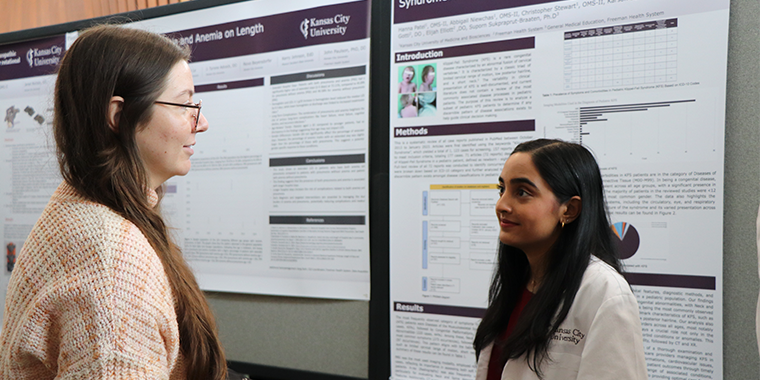Kansas City University’s (KCU) 33rd Annual Research Symposium brought together students, faculty, residents, alumni and research partners for a record-breaking celebration of scientific discovery and academic excellence. Held at both the Kansas City and Joplin campuses, the four-day event showcased a growing culture of research and inquiry.
This year, 272 abstracts were submitted, addressing a wide range of topics including:
- The use of artificial intelligence to personalize and enhance the training of future physicians;
- A rare pediatric bone infection affecting the knee and how doctors can improve diagnosis and treatment;
- Causes of joint pain in rural communities of Guatemala;
- The impact of genetic changes on the body’s ability to process RNA—a critical part of cellular function;
- A promising strategy to stop pancreatic cancer growth by targeting specific molecules in the tumor’s environment.
A total of 246 posters were presented—113 in Joplin and 133 in Kansas City. Additional sessions included:
- 25 oral presentations by KCU students,
- 44 virtual presentations by graduate medical education (GME) residents, and
- 15 Summer Student Research Fellowship presentations.
The symposium also welcomed contributions from alumni, research partners and regional collaborators, including 10 posters from partner institutions and two from alumni, with eight alumni returning to serve as judges.
The event featured a distinguished lineup of keynote and invited speakers, offering attendees insights into emerging issues in biomedical research, medical education and public health. Russell Swerdlow, MD, from the University of Kansas Medical Center, delivered the keynote address, exploring the complex relationship between mitochondria and mitochondrial cascades in Alzheimer’s disease—an area that may hold the key to new approaches in diagnosis and treatment.
Other featured speakers included:
- Ehab Sarsour, PhD (KCU), on targeting lipid metabolism in stromal and cancer cells to enhance cancer treatment efficacy;
- Gretchen Gibson, DDS (KCU), on leveraging electronic health records to evaluate treatment effectiveness;
- Jeff Staudinger, PhD (KCU), on how gene regulation affects drug responses in colon cancer cells;
- Aaron Segal, PhD (KCU), on public perspectives regarding compensation for donating biological samples for research;
- Barbara Binzak-Blumenfeld, PhD, an FDA regulatory expert from Buchanan Ingersoll & Rooney PC, on the the FDA’s role in scientific research and clinical practice;
- Angela Slitt, PhD, from the University of Rhode Island, on using pharmaceutical frameworks to study the movement and health effects of PFAS—or “forever chemicals.”
A student panel also offered practical advice on how to get involved in research at KCU, with student researchers sharing their own experiences and insights.
Reflecting on the symposium’s success, Bradley Creamer, PhD, chair of Basic Sciences and Research Symposium Committee chair, emphasized its value in supporting student development.
“The Research Symposium gives our students a platform to share their work, build confidence in communicating science and gain feedback from peers and mentors,” Creamer said. “It’s an essential part of the learning experience at KCU and highlights the innovative spirit across our campuses.”
That sentiment was echoed by third-year medical student Jayce Greek, who reflected on the personal impact. “This was an important interprofessional growth moment for me. Being part of this study will open doors for me that could lead to future research or residency opportunities.”
For a list of award winners, click here.



_20241112091819.png?w=140&h=140)
_20241022094505.png?w=140&h=140)
(0) Comments